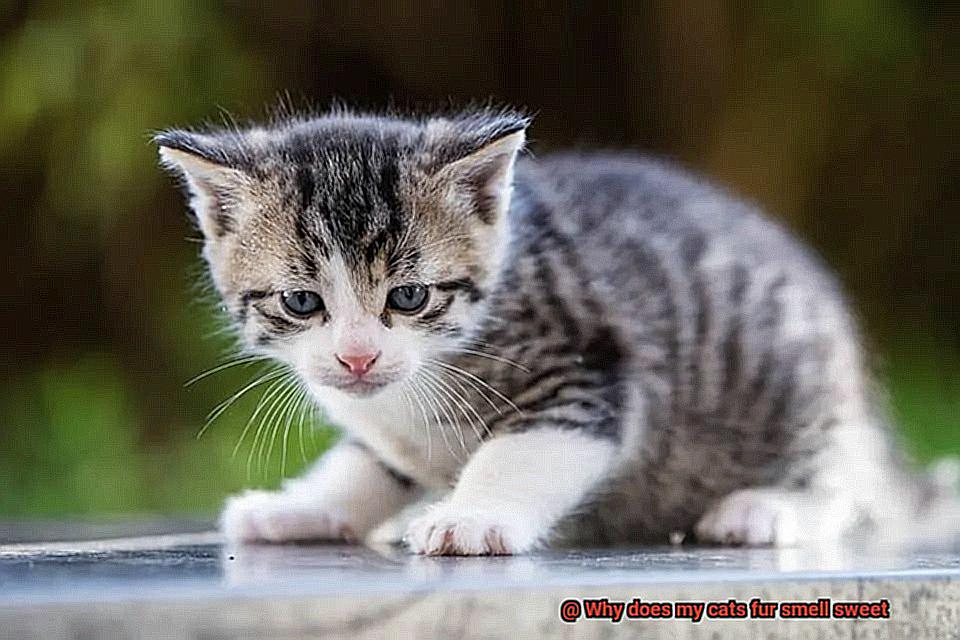Cats are notorious for their finicky eating habits and selective taste buds. But what happens when your cat refuses to eat altogether and goes as far as trying to bury their food? As a pet parent, it’s natural to feel concerned and bewildered by this behavior. However, before you hit the panic button, know that this is a common occurrence among cats with various underlying causes.
Is your furry friend feeling unwell or stressed? Are they displaying any other unusual symptoms? These are just some of the questions you should ask yourself when trying to decipher why your cat is not eating or burying their food. From adjusting to new surroundings to dental issues and gastrointestinal problems, there are several reasons why your cat may be acting this way.
In this blog post, we will explore the many possible reasons behind why your cat is not eating and trying to bury their food. We’ll delve into medical conditions that could cause this behavior, along with factors like diet changes, stress, and even age-related changes. By understanding what’s causing this behavior, you can take the necessary steps to get your feline friend back on track and ensure their long-term health and happiness. So let’s dive in.
Common Causes of Burying Behavior in Cats
This behavior can be both fascinating and puzzling, but it is essential to understand that there are several common causes behind this behavior.
First and foremost, burying food is a natural instinct in cats. In the wild, cats would cover their food to hide it from predators or to save it for later. Although domesticated cats do not need to worry about predators, this instinct may still be ingrained in them.
However, burying food can also indicate discomfort or dissatisfaction with their food. Your cat may be trying to hide the smell of their food or cover it up because they do not enjoy the taste or texture. If you notice this behavior consistently, it may be necessary to switch to a different type of food or adjust their feeding schedule.
It’s also possible that burying food can be an indication of a medical issue such as dental pain or digestive problems. If your cat is burying their food and showing other signs of discomfort such as vomiting or diarrhea, it is crucial to take them to the vet for an examination.
Aside from medical issues, some cats may bury their food as a form of play or entertainment. This behavior is more common in kittens but can also occur in adult cats who are feeling bored or playful.
Furthermore, changes in a cat’s environment can also cause burying behavior. For instance, moving to a new home or the introduction of a new pet or family member can stress your cat and lead to changes in their behavior.
Stress and Anxiety as a Cause of Burying Behavior
However, this behavior may be an indication of underlying stress and anxiety. Cats are creatures of habit and routine, so any disruption to their daily lives can cause them to feel uneasy. This can include environmental changes, such as a move to a new home or the introduction of a new pet, changes in feeding routines, or even changes in their owner’s schedule.
In addition to environmental factors, cats may experience anxiety due to illness, pain, or discomfort. In some cases, cats may avoid eating altogether or bury their food as a way of coping with their discomfort. Furthermore, anxiety-related behavioral issues such as over-grooming or inappropriate urination may also occur.
It’s crucial to note that not all cats will exhibit the same behaviors when they are stressed or anxious. Some cats may become more vocal, while others may hide or become more aggressive. Therefore, it’s essential to observe your cat’s behavior closely and seek advice from your veterinarian if you suspect they are experiencing stress or anxiety.
Fortunately, there are several things that you can do to help alleviate stress and anxiety in your cat. Providing a quiet and comfortable space for your cat to retreat to can be helpful, as can creating a consistent routine for feeding and playtime. Additionally, using pheromone sprays or diffusers can help calm cats in stressful situations.
In some cases, medication may be necessary to manage your cat’s stress or anxiety effectively. Your veterinarian can recommend the best course of treatment based on your cat’s individual needs.
Changes in Environment and Routine as a Cause of Burying Behavior
Cats are creatures of habit, and they thrive on routine and consistency. Any sudden changes in their environment or schedule can cause them to feel anxious and stressed, leading to unusual behavior such as burying their food. This behavior is often a coping mechanism for cats who are struggling to adapt to new situations.
One common reason for burying behavior is a change in the cat’s living situation. Moving to a new home or the addition of a new pet or family member can disrupt their routine and cause stress. To cope with these feelings, cats may resort to burying their food as a way to assert their dominance or mark their territory.
Similarly, any changes to the location or type of food can also trigger this behavior. Your cat may be trying to hide their food from other pets or simply trying to maintain control over their environment.
It’s important to note that burying behavior does not necessarily mean your cat is refusing to eat. In fact, they may still be consuming their food but displaying unusual behavior afterward.

So how can you help your feline friend adjust to changes in their environment and routine? One approach is to maintain a consistent routine as much as possible. This means feeding your cat at the same time each day and providing plenty of playtime and exercise to help them burn off excess energy.
Creating a calm and quiet space for your cat can also help reduce anxiety and stress levels. Consider providing a cozy hiding spot where they can retreat when feeling overwhelmed, or using calming music or pheromone sprays.
If you need to make changes in your cat’s environment or routine, try introducing them gradually instead of all at once. For instance, if you’re moving your cat’s food bowl, start by placing it nearby for a few days before moving it to its final location.
Dental Pain or Discomfort as a Cause of Burying Behavior
While this behavior can arise from changes in living situations or food types, it can also indicate dental pain or discomfort in your cat. Dental problems such as broken teeth, gum disease, and oral tumors can cause pain and discomfort in cats, making it challenging for them to eat.
The discomfort associated with eating may lead the cat to try and bury their food to avoid the pain, which can be alarming for pet owners. However, if left untreated, dental problems can cause further health issues and even lead to infections that can spread throughout the body.
So, what should you do if your cat is exhibiting burying behavior with their food? The first step is to take them to a veterinarian for an examination. A dental exam may be necessary to identify any underlying dental issues that could be causing the problem.
Treatment options may range from a dental cleaning for mild cases to tooth extraction or medication for more severe cases to manage pain and inflammation. Regular veterinary exams and teeth cleanings can help prevent dental issues from developing or catch them early before they become more severe. Providing your cat with appropriate chew toys and a balanced diet can also help maintain good oral health.
It is crucial not to ignore other symptoms that may accompany burying behavior in cats with dental issues, such as drooling, bad breath, and pawing at their mouth. Quick action is necessary to avoid further complications.
Medical Conditions That May Lead to Burying Behavior
This behavior may seem cute or harmless, but it could actually be a sign of a medical condition that requires attention. Here are some medical conditions that may lead to burying behavior in cats, and what you can do to help your furry friend.
Dental Problems
Dental pain or discomfort is one of the most common reasons why cats avoid eating altogether or only eat small amounts before burying the rest. Cats have a natural instinct to bury any remaining food to avoid giving away their location to predators. If you notice your cat avoiding their food or showing signs of dental problems such as bad breath or swollen gums, it’s essential to consult with a veterinarian.
Gastrointestinal Issues
Cats with stomach or intestinal problems may feel nauseous after eating and try to bury their food to avoid eating more. Additionally, some cats with kidney disease may develop an aversion to food, leading them to bury it instead of eating it. If you notice your cat exhibiting symptoms such as vomiting, diarrhea, or loss of appetite, it’s crucial to seek veterinary care.

Neurological Disorders
Some neurological disorders can affect a cat’s appetite and behavior towards food. For example, hyperthyroidism can cause increased hunger but also a decreased appetite due to nausea or vomiting. In some cases, this may lead a cat to bury its food instead of eating it. If you notice your cat exhibiting unusual behaviors related to food such as excessive hunger or refusal to eat, it’s important to consult with a veterinarian.
Signs to Look for When Your Cat is Not Eating and Trying to Bury Food
This behavior can indicate an underlying health issue, and as a responsible pet owner, it’s essential to recognize these signs. Here are some things to look out for:
- Weight loss: If your cat has suddenly lost weight or has been gradually losing weight over time, it could be due to not eating enough. Regularly weigh your cat at home or take it to the vet for a check-up. A sudden drop in weight is an alarming sign and requires immediate attention.
- Lethargy: Cats are known for their playful and energetic nature, so if you notice that your cat is sleeping more than usual or seems less active, it may be due to a lack of nutrients. This could be a sign that your cat is not eating enough and needs medical attention.
- Vomiting or diarrhea: Not eating can cause gastrointestinal upset leading to vomiting or diarrhea. Monitor your cat’s bowel movements and seek veterinary attention if it persists for more than a day or two.
- Excessive burying: While cats do bury their food when they are full or don’t like the taste, excessive burying or burying immediately after being served can be a sign of stress or anxiety. Stressful situations such as changes in the household, new pets, or loud noises can cause cats to become anxious and lose their appetite.

How to Address Burying Behavior in Cats
Burying behavior in cats is a common and natural instinct, but it can also be a sign of underlying issues. As an expert in addressing this behavior, I have compiled the following tips on how to help your cat overcome burying behavior.
Understand the Reason Behind the Behavior
Burying behavior can be due to several reasons, including stress, anxiety, or digestive issues. It’s important to identify the cause of the behavior to address it effectively. If you’re not sure why your cat is burying their food, consult with your veterinarian.
Experiment with Different Types of Food
Cats are notoriously picky eaters, and if they don’t like the taste or texture of their food, they may try to bury it. Experiment with different flavors and textures until you find something that your cat likes. This can help prevent burying behavior caused by food aversions.
Reduce Your Cat’s Stress Levels
Stress and anxiety are common triggers for burying behavior in cats. Try to create a calm and comfortable environment for your cat by providing a quiet and private space for them to eat, plenty of toys and activities to keep them occupied, or using pheromone sprays or diffusers to help calm them down.
Consult with a Veterinarian
If your cat’s burying behavior persists despite your efforts to address the issue, it may be time to consult with a veterinarian. There may be an underlying medical issue that is causing the behavior, such as dental problems or gastrointestinal issues. A vet will be able to provide you with guidance and treatment options.
Provide a Comfortable Feeding Environment
Cats prefer a comfortable and secure feeding environment. Place their food bowl in a location where they feel safe and secure, away from any potential stressors or distractions. You may also want to consider providing multiple feeding stations throughout your home.
Provide Mental and Physical Stimulation
Cats who are bored or understimulated may exhibit burying behavior as a way to cope. Provide your cat with plenty of mental and physical stimulation throughout the day, such as playing with toys, providing scratching posts or climbing structures, or engaging in interactive playtime with your cat.
Prevention Tips for Reducing Stress-Related Eating Issues in Cats
Cats are fascinating creatures that can be easily stressed, leading to a loss of appetite and changes in eating behavior. As a responsible cat owner, it’s essential to identify and address stressors in your feline friend’s environment. Here are five prevention tips for reducing stress-related eating issues in cats.
Provide Adequate Playtime and Mental Stimulation
Cats are natural predators and require plenty of playtime and mental stimulation to stay happy and healthy. Interactive toys such as puzzle feeders, laser pointers, and feather wands can keep your cat entertained and engaged. Regular playtime can help release their pent-up energy and reduce stress.
Establish a Consistent Feeding Routine
Cats thrive on routine, and feeding them at the same time each day can help reduce their stress levels. Choose a quiet and calm location for their mealtime to prevent any disruptions or distractions. Avoid sudden changes in their diet as this can cause digestive problems and exacerbate stress-related eating issues.
Provide Access to Fresh Water
Keeping your cat hydrated is critical for their overall health and wellbeing. Ensure that they have access to fresh water at all times, especially during hot weather or if they’re on a dry food diet. Dehydration can cause digestive problems and aggravate stress-related eating issues.
Monitor Their Overall Wellbeing
Regular check-ups with your veterinarian are crucial for monitoring your cat’s overall wellbeing. Ensure that they’re getting enough exercise, mental stimulation, and a healthy diet to prevent any underlying medical issues that may cause stress-related eating problems. If you notice any changes in their appetite or eating behavior, consult with your vet immediately.
Incorporate Natural Remedies
Several natural remedies can help reduce stress levels in cats, including herbal supplements such as chamomile or valerian root. These supplements can help calm your cat’s nerves and reduce anxiety levels. Additionally, incorporating playtime or interactive toys into their routine can provide mental stimulation and distraction from stressful situations.
VV2YCAvdTEg” >
Conclusion
To sum it up, when your beloved cat refuses to eat and tries to bury their food, it’s natural to feel worried. But don’t fret, understanding the causes behind this behavior is the key to ensuring your furry friend’s long-term well-being.
There are various reasons why cats exhibit burying behavior such as stress, anxiety, dental issues, gastrointestinal problems or changes in routine. Identifying what triggers this behavior is crucial in addressing it effectively.
To prevent this issue from happening, you can provide ample playtime and mental stimulation for your cat, establish a consistent feeding schedule, monitor their overall health and wellness, ensure access to fresh water and try natural remedies that can help reduce stress-related eating issues.
However, if despite all efforts your cat continues to exhibit burying behavior or shows other symptoms like weight loss and lethargy, seek veterinary attention immediately.







